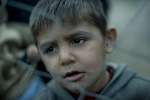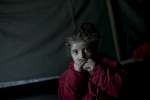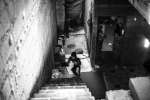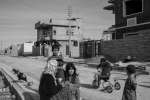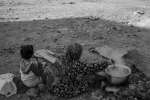Congolese refugee boy wins international peace award for running radio programme
News Stories, 4 December 2009
THE HAGUE, Netherlands, December 4 (UNHCR) – A 16-year-old Congolese boy has been awarded the annual International Children's Peace Prize for producing a radio programme for children in a Tanzanian refugee camp.
Baruani Ndume, who is an orphan, was handed the prize by Kenyan Nobel Peace laureate Wangari Maathai during an event on Thursday in The Hague, political capital of the Netherlands. Guests included Dutch Prime Minister Jan Peter Balkenende and UNHCR Regional Representative for Western Europe Wilbert van Hövell.
The prize, organized by the Dutch foundation, KidsRights, is awarded to a child "whose courageous or otherwise remarkable acts have made a difference in countering problems which affect children around the world." It comes with a cash purse of 100,000 euros to be spent on projects related to the winner's work.
The jury found that Ndume, programme coordinator for the "Children for Children" show in Tanzania's Lugufu Refugee Camp, had, "under the most impossible circumstances ... chosen to champion the rights of other children."
The radio progamme focuses on education for children with difficulties as well as on family reunification. It has helped parents in the Democratic Republic of the Congo (DRC) trace children they were separated from. "Boys and girls with stories similar to mine could not easily express themselves and were keeping their pain inside," Ndume said. "Our radio programme makes them feel less alone."
Ndume was born in the DRC's South Kivu province. His father died when he was four, while his mother and younger brother were murdered when conflict erupted once more in the region in 1998. Soldiers herded the family and other villagers into a house before torching it. "As I was small, I managed to escape through a little hole in the wall," he recalled.
Another villager took Ndume in hand and they made their way across Lake Tanganyika to Tanzania. In Lugufu, he received assistance from UNHCR and the agency's partners, including education and health care.
Ndume kept his past bottled up until one day in April last year. "I approached the UNHCR partner organization World Vision, which was running a radio programme called 'Child Voice Out,' I was selected among other refugee children and started as a young journalist for this programme broadcast every Sunday," he explained.
Meanwhile, Ndume is optimistic about the future and does not dwell on the past. "I hope to go to university one day and become a journalist," he revealed.
Almost half of the millions of forcibly displaced people helped by UNHCR around the world are aged under 18.









